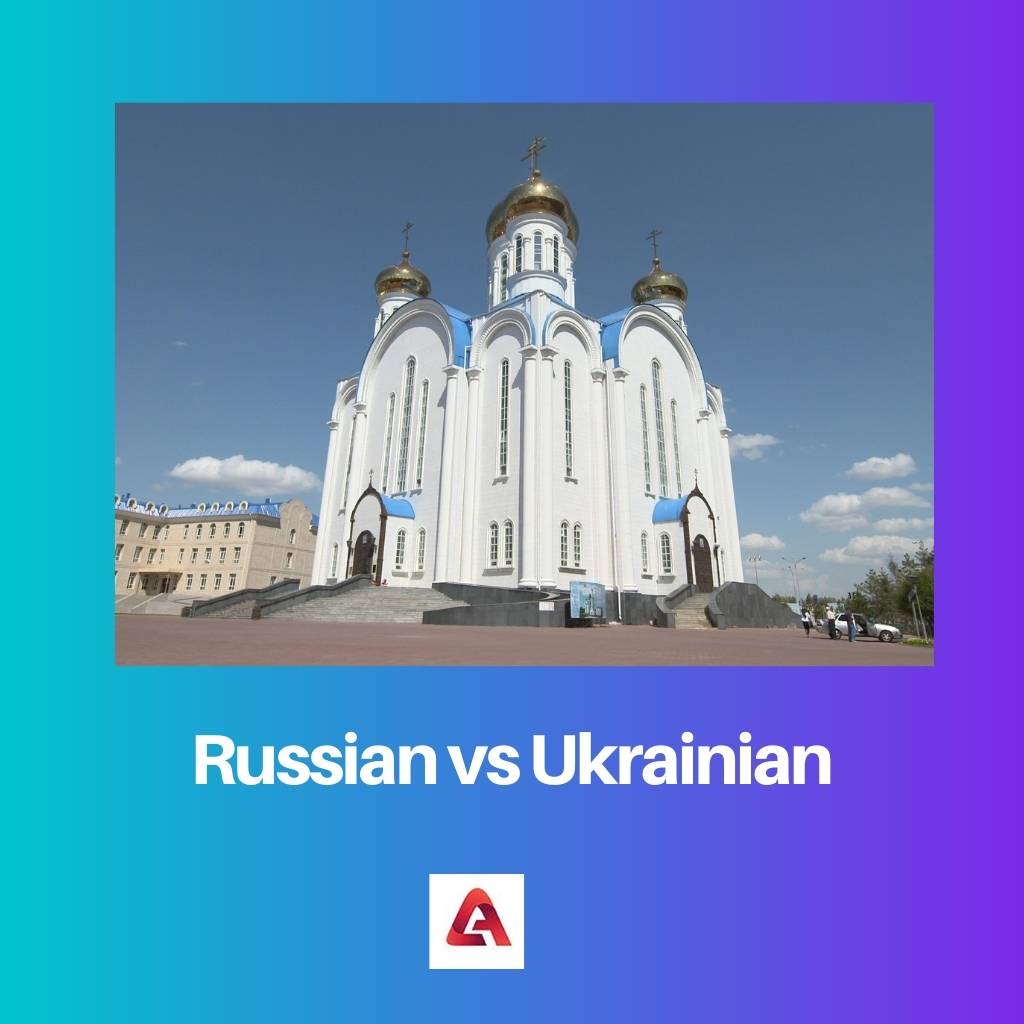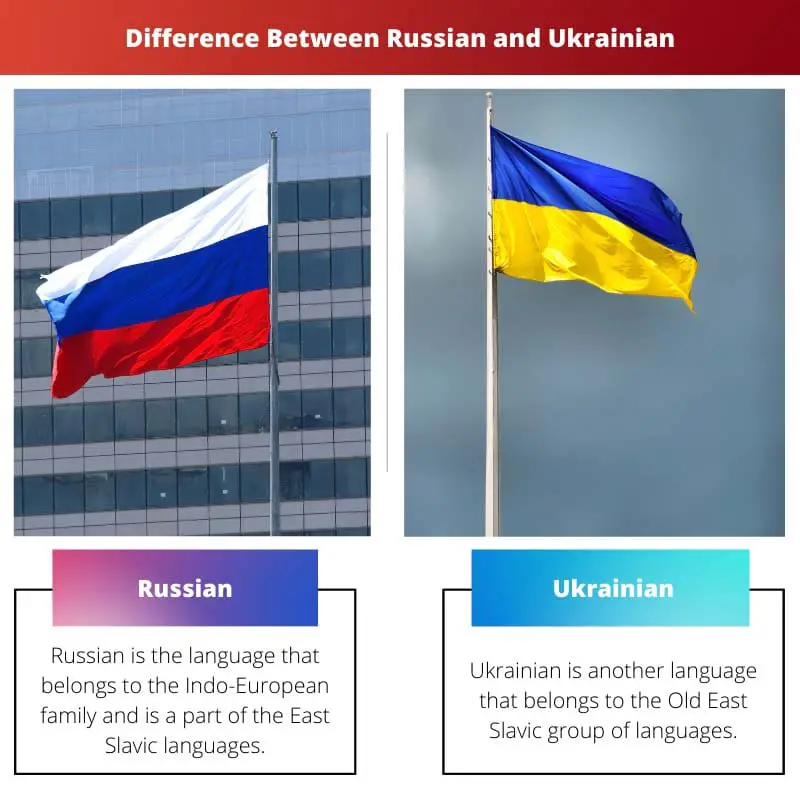Russian and Ukrainian are confused with one another. It is also falsely believed that the two languages are the same and that Ukrainian is only a vernacular of the Russian language.
But this, in fact, is not true. Even though the two languages have the same root, they are different from each other in multiple aspects.
Key Takeaways
- Russian is the official language of Russia, while Ukrainian is the official language of Ukraine.
- Russian uses the Cyrillic alphabet, while Ukrainian uses the Cyrillic alphabet with additional letters.
- Russian is spoken by a larger number of people worldwide than Ukrainian.
Russian vs Ukrainian
The difference between Russian and Ukrainian is that the Russian language has different alphabets than the Ukrainian language. Even though the two languages share a common history, they differ from each other in terms of their vocabulary, pronunciation of words, and so on.

Russian is a language that belongs to the Indo-European family of languages. Out of the four persisting languages that are a part of the East –Slavic group, Russian is one.
It is also the Slavic language that is spoken the most. Russian as a language of the office is used by four countries including Russian, Belarus, Kazakhstan, and Kyrgyzstan.
Ukrainian, on the other hand, is the native as well as the official language of the country Ukraine. This language has its origin in the Old East Slavic languages.
The roots of the Ukrainian language flow deep in the Indo-European family of languages. Ukrainian was initially known as Ruthenian.
Comparison Table
| Parameters of Comparison | Russian | Ukrainian |
|---|---|---|
| Alphabets | It has certain alphabets that Ukrainian lacks. For instance, Ё, ъ. | It has some alphabets that Russian doesn’t have. These include ї, є. |
| Consonants | The usage of soft consonants is less. | Ukrainian has more soft consonants. |
| Tenses | Russian has only two ways to refer to the future tense. | Ukrainian uses three ways to refer to the future tense. |
| Noun | The nouns in the Russian language are present in six cases. | The nouns of the Ukrainian language have seven cases. |
| Pronunciation | The letter ‘o’ is pronounced as ‘a’. | Ukrainian ‘o’ is always pronounced as ‘o’. |
| Speakers | It has approximately 150 million speakers. | The number of speakers of Ukrainian comes to be around 35 million. |
What is Russian?
Russian is a language that belongs to the Indo-European family and is a part of the East Slavic languages. It is one of the four East Slavic languages that are still used and spoken.
It is the most widely spoken language of all the other East Slavic languages.
It is the language that is spoken by the natives of Russia. Apart from Russia, the language is used as the official language of three other nations.
These include Kyrgyzstan, Belarus, and Kazakhstan. According to data published in 2012, there are approximately 150 million speakers of this language.
The first dictionary for the Russian language was published in 1783. Russian has been accredited to be the largest native language in the continent of Europe.
The modern form of the language was introduced in the 18th century. This happened because of the reforms carried out by Peter the Great.
The Russian language has soft and hard sounds or consonants, wherein the number of hard consonants is more.
After the reforms that were introduced by Peter the Great, the Russian language came to include words that had their origin in French, Latin, German, and even Italian languages.

What is Ukrainian?
Ukrainian is another language that belongs to the Old East Slavic group of languages. It has its origin in the family of the Indo-European language family.
This language was earlier known as the Ruthenian language. The script it uses is the Cyrillic script variant.
It is known to be the native as well as the official language of the country, Ukraine. Since the seventeenth century, the Ruthenian or popularly known as the Ukrainian language has been widely in use, especially throughout the Ukrainian state.
According to a census done in 2000, this language has approximately 35 million speakers.
The birth of this language is said to have been associated with the medieval period of Kievan Rus. Later, when it was overtaken by the Tatars, the language was called the Ruthenian language.
The language of today called the Ukrainian language, was introduced when Cossack Hetmanate got established in the 17th century.
The Ukrainian language has more soft consonants. It is one of the very few languages that consider a third way to refer to the future tense.
It uses the apostrophe instead of the commonly used Russian hard sign. It provides for the seventh case of the noun that has been termed as a vocative case.

Main Differences Between Russian and Ukrainian
- Russian is the official language of Russia and three other countries, whereas Ukrainian is the official state language of only the country of Ukraine.
- Russian uses the hard sign, but in Ukrainian, this sign is replaced with the usage of an apostrophe.
- While Russian has six cases of a noun, the Ukrainian language uses a seventh case that has been termed the vocative case.
- Russian has more speakers than Ukrainian speakers. While the speakers of the Russian language are close to 150 million, those of the Ukrainian language come to be around 35 million only.
- Russian uses a lesser number of consonants, whereas the Ukrainian language incorporates a higher number of soft consonants.
- Russia has only two ways of referring to future happenings. On the other hand, the Ukrainian language has a third way of referring to the future tense.

- https://www.taylorfrancis.com/books/mono/10.4324/9780203065877/russian-language-today-larissa-ryazanova-clarke-terence-wade
- http://www.irbis-nbuv.gov.ua/cgi-bin/irbis_nbuv/cgiirbis_64.exe?I21DBN=LINK&P21DBN=UJRN&Z21ID=&S21REF=10&S21CNR=20&S21STN=1&S21FMT=ASP_meta&C21COM=S&2_S21P03=FILA=&2_S21STR=Vejpte_2017_4(2)__3

This article effectively clarifies the misconceptions about Russian and Ukrainian. It’s clear that they are distinct languages with unique characteristics that should be acknowledged and respected.
I couldn’t agree more. It’s crucial to recognize and appreciate the differences between these two languages.
The information about the history and origins of both languages provides valuable context. This is an incredibly educational piece for anyone interested in understanding more about Russian and Ukrainian.
I found this article to be extremely enlightening. The linguistic depth explored here is truly impressive.
The way this article delved into the linguistic nuances of Russian and Ukrainian is truly commendable. A great resource for language enthusiasts.
As a linguist, I found this article to be very well-written and thoroughly researched. The historical context provided for both languages is especially useful in understanding how they developed over time.
I completely agree. It’s evident that the language distinctions have deep historical roots, and this article effectively captures that.
The comparison table is a fantastic addition to this article. It clearly outlines the linguistic differences between Russian and Ukrainian.
The in-depth analysis of Russian and Ukrainian provides a comprehensive understanding of their linguistic disparities. This is an invaluable resource for those seeking clarity on this subject.
The attention to detail in this article is remarkable. A truly enlightening read for anyone interested in languages.
I found the breakdown of the linguistic features to be incredibly insightful. This article sheds much-needed light on these languages.
I appreciate the detail about the alphabets, consonants, tenses, noun cases, and pronunciation differences between the two languages. This article is a great resource for anyone looking to learn about Russian and Ukrainian.
This is a thorough and well-researched article. It’s refreshing to find such high-quality content on linguistic topics.
The linguistic differences between Russian and Ukrainian are fascinating, and this article does an excellent job of breaking it down.
This is a very informative article that highlights the differences between the Russian and Ukrainian languages. Many people are confused between the two, and it’s essential to understand their distinctions. Thanks for sharing.
I have always wondered about the differences between Russian and Ukrainian, and this article explained it very clearly. I appreciate the detail included.
I found this article quite enlightening. The comprehensive comparison table really helps to understand the differences between the two languages.
This article effectively dispels the misconceptions surrounding Russian and Ukrainian. It’s a testament to the informative and insightful nature of this piece.
The clarity provided regarding the linguistic distinctions between Russian and Ukrainian is truly commendable. A fantastic read.
The articulation of linguistic differences is executed with precision in this article. It’s a commendable resource for linguistic studies.
Absolutely. The depth of analysis and research is evident throughout the article.
As a language enthusiast, I thoroughly enjoyed this article. It’s evident that the differences between Russian and Ukrainian are rich and nuanced, and this piece captures that brilliantly.
I couldn’t agree more. The article strikes an excellent balance between depth and accessibility.
The article’s comprehensive approach to comparing Russian and Ukrainian is truly praiseworthy. It offers an invaluable perspective on these two languages.
I couldn’t agree more. This article is an exceptional resource for understanding the complexities of Russian and Ukrainian.
The depth and detail in this comparison of Russian and Ukrainian languages are truly impressive. It’s a great contribution to linguistic discourse.